Analysis and commentary on the Network’s experiences coordinating climate-resilient development.
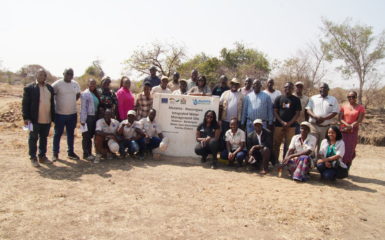
Namibia-Zambia 1:1 Peer Learning Workshop on the National Adaptation Planning Process: Focus on the transition from planning to implementation
Lusaka, Zambia | August 7-9, 2024
Adaptation decision-makers from Namibia and Zambia met in Lusaka, Zambia, for a 1:1 bilateral peer learning workshop to share lessons and experiences on the national adaptation plan (NAP) process with a focus on the transition from planning to implementation. The NAP Global Network provided technical and financial support for the workshop through funding from the […]
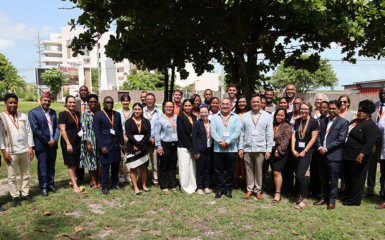
Forum d’apprentissage par les pairs: Alignement des plans nationaux d’adaptation (PNA) et des contributions déterminées au niveau national (NDC)
Ville de San Pedro, Belize | 12 août - 14 août 2024
Le Réseau mondial de PNA et le gouvernement du Belize ont co-organisé un forum mondial d’apprentissage par les pairs de 3 jours du 12 au 14 août au Grand Caribe Resort à San Pedro Town, Belize, pour partager des expériences en matière de renforcement de l’alignement entre les plans nationaux d’adaptation (PNA) et les contribution […]

Peer Learning Forum: Alignment of National Adaptation Plans (NAPs) and Nationally Determined Contributions (NDCs)
San Pedro Town, Belize | August 12 - August 14, 2024
The NAP Global Network and the Government of Belize co-organized a 3-day global peer learning forum from August 12 to 14 at the Grand Caribe Resort in San Pedro Town, Belize, to share experiences in strengthening the alignment between national adaptation plans (NAPs) and nationally determined contributions (NDCs). The NAP Global Network provided technical and […]
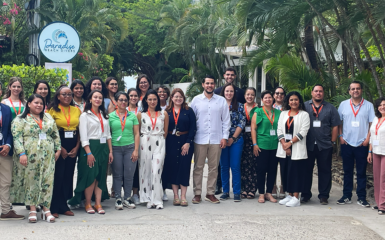
Grupo de Aprendizaje entre Pares: Alianzas con la Sociedad Civil para la Adaptación Justa y Equitativa al Cambio Climático en América Central
Roatán, Honduras | 27 y 29 de junio, 2024
La segunda reunión del Grupo de Aprendizaje entre Pares de América Central y República Dominicana tuvo lugar entre el 27 y 29 de junio en Roatán, Honduras. Miembros de la sociedad civil y representantes gubernamentales de los ministerios de ambiente y encargados de la planificación y el financiamiento de la adaptación de Belice, Costa Rica, […]
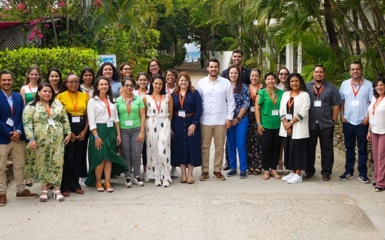
COMUNICADO DE PRENSA | Representantes de Gobiernos de América Central, República Dominicana y de la Sociedad Civil Dialogan para Impulsar la Adaptación al Cambio Climático
ROATÁN, HONDURAS, 27 de junio, 2024 – Representantes de cinco países de América Central y de la República Dominicana, así como miembros de la sociedad civil organizada inician una serie de diálogos del 27 al 29 de junio en la Isla Roatán, Honduras, para fortalecer los procesos de adaptación al cambio climático de las comunidades, […]
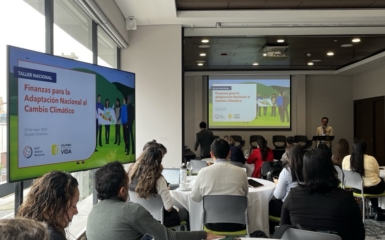
Colombia Fomenta Diálogo para Impulsar la Articulación Intersectorial para el Financiamiento de la Adaptación al Cambio Climático
El pasado 23 de mayo, el Departamento Nacional de Planeación (DNP) y la Red Global del PNA inauguraron el evento “Finanzas para la Adaptación Nacional al Cambio Climático” en Bogotá, Colombia. El objetivo principal del encuentro fue fortalecer la articulación institucional para impulsar el proceso de adaptación. Durante el evento organizado por el DNP y […]

Colombia Fosters Dialogue to Promote Intersectoral Articulation for Climate Change Adaptation Financing
On May 23, the National Planning Department and the NAP Global Network held the Finance for National Adaptation to Climate Change event in Bogota, Colombia. This event, which aimed to strengthen institutional coordination to advance national climate change adaptation processes, was held under the framework of the climate adaptation and resilience group of the Intersectoral […]
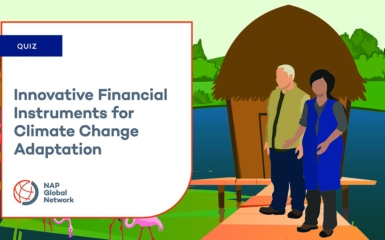
Quiz | Innovative Financial Instruments for Climate Change Adaptation
By Deborah Murphy, Senior Associate, NAP Global Network Secretariat (IISD)
Significant financial resources are required now and in the coming decades for people and systems to adapt to a changing climate. Developing countries need about USD 212 billion per year up to 2030 to address their adaptation needs, yet adaptation finance flows were only USD 56 billion in 2021-2022.1 Private sector investment has a pivotal […]
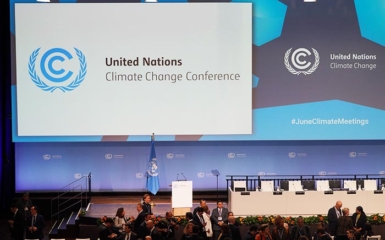
What Is the NAP Assessment in Bonn, and Why Does It Matter?
By Orville Grey and Jeffrey Qi, NAP Global Network Secretariat, IISD
At the UN Bonn Climate Change Conference (SB 60), taking place from June 3 to 13, countries will initiate an assessment of their progress in formulating and implementing their NAPs. We look more closely at what that means, and what’s at stake. What is the Assessment of Progress in the NAP process? The benefits of […]
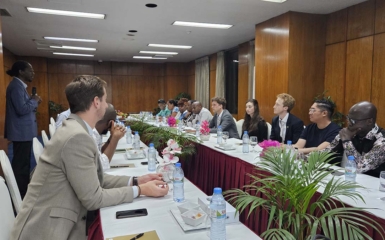
NAP Global Network Reflects on a Decade of Support with Least Developed Countries
On April 24, on the margins of the ninth NAP Expo 2024 in Dhaka, Bangladesh, the NAP Global Network hosted a unique consultation meeting with 12 representatives of least developed countries (LDCs), as well as the Network’s funders and steering committee members. In this meeting, attendees reflected on a decade of support to advance national […]

From Blueprint to Reality: Building the foundations for effective national adaptation plan processes with the new MEL Toolkit
Emilie Beauchamp (IISD/NAP GN) and Patrick Pringle (Tonkin + Taylor)
Designed for government teams responsible for leading their country’s NAP processes, the NAP Global Network and Adaptation Committee’s new Toolkit for Monitoring, Evaluation, and Learning (MEL) of National Adaptation Plan (NAP) processes aims to put the principle of adaptive management at the heart of NAP processes, emphasizing how ongoing learning from MEL is integral to […]
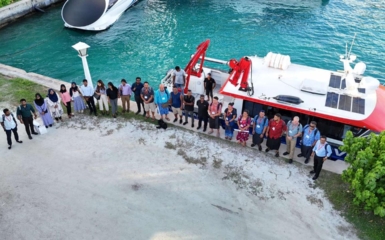
Peer Learning Cohort: Coalition of Atoll Nations on Climate Change (CANCC) Workshop on National Adaptation Planning, With a Focus on Coastal Adaptation
North Malé Atoll, Maldives | May 1 - May 3, 2024
As Chair of the Coalition of Atoll Nations on Climate Change (CANCC), the Republic of Maldives hosted a 3-day Peer Learning Cohort workshop on National Adaptation Plan (NAP) processes—with a focus on coastal adaptation—from May 1 to 3, 2024. The NAP Global Network provided technical and financial support for the workshop through funding from the […]